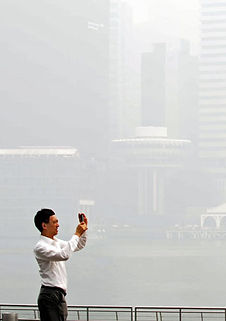Schuster Institute for Investigative Journalism
at Brandeis University
i n v e s t i g a t i o n s
































































Our investigation reveals that some palm oil--the most widely used vegetable oil in the world--is produced with slave labor. Palm oil is in all the products above, and many more.
Palm Oil Controversies
Photo | Rainforest Action Network
Inset Photo: CBCNews
The Abuse: Public Health
The palm oil industry has brought great new wealth to Indonesia and neighboring Malaysia. But not everyone is experiencing the resulting prosperity.
Above, Sekonyer community members watch as an excavator tears down trees and digs a drainage canal in preparation for new plam oil plantations in one of the last areas of natural forest remaining in the buffer zone of the Tanjung Puting National Park.
Photo inset: Air pollution levels rose in June in the region around Indonesia, where forest fires burned.
Health Problems Associated
with Palm Oil Production Practices
There are several major factors connected to current methods of palm oil production that are adversely affecting public health in Indonesia.
Perhaps the most obvious are the health hazards caused by the many forest fires in Indonesia. Smoke from forest fires raises haze levels and continues today to present a public health risk not only for Indonesians but also for people in neighboring Malaysia, Singapore, and other nearby countries. Authors of a 2009 article in the Biologist report that "following the 1997 fires, an estimated 20 million people in Indonesia suffered from respiratory problems, with 19,800-48,100 premature mortalities (Heil, 2007)." Respiratory illness is the third most common cause of death in all age groups in Indonesia and the leading cause of death in infants and children under five according to the UCLA School of Public Health (2004).
Deteriorating health is also linked to the degradation of fresh water supplies by waste processing methods used in palm oil production. "For every metric tonne of palm oil produced, 2.5 metric tonnes of effluent are generated from processing the palm oil in mills. Direct release of this effluent can cause freshwater pollution, which can affect downstream biodiversity and people," says the World Wildlife Fund (WWF).The damage to rivers, streams, and ground water is illustrated in the above video documentary "Manufacturing Consent," and demonstrates the damage the razing of forests for new agricultural developments has on communities.
What "Manufacturing Consent" and the films about the palm oil industry by Journeyman Productions also show is how indigenous peoples can lose access to their farmlands and the forests upon which they depend for subsistence. This lost access means local people are severely inhibited from growing their own food or foraging the forests for food and herbal medicines, which increases their general food insecurity.
While the palm oil industry's use of fertilizer and herbicides like glyphosate (Roundup) and Paraquat is not heavy compared to amounts used on other crops, says WWF, they are used often enough to pose severe threats to human health since many who apply them, including women and children often tasked with the job, aren't provided with protective gear and don't know about their associated health risks. A new study published in the scientific journal Entropy has found that heavy use of Roundup is linked to a "range of health problems and diseases, including Parkinson's, infertility and cancers" according to a Reuters report.
The people of Indonesia are especially vulnerable to natural disasters connected to extreme weather and changing climate, as was evidenced most spectacularly by the 2004 tsunami. Increased flooding, drought, air and water pollution, and loss of access to land are all contributing factors that hinder the public's general health and well-being.
Further reading
"Exploitative Labor Practices in the Global Palm Oil Industry," Accenture, 2013
“The oil palm industry: A road to poverty reduction,” Philippine Daily Inquirer, February 18, 2013
“Palm oil and indigenous peoples in South East Asia,” Forest Peoples Programme and the International Land Coalition, January 17, 2011
“Land is life: Land rights and oil palm development in Sarawak,” Forest Peoples Programme, November 5, 2011
“Social Conflicts – Inequity and Rights Abuses,” Sawit Watch, July 26, 2011
“Oil Palm Expansion in Southeast Asia: Trends and implications for local communities and indigenous peoples,” Forest Peoples Programme and Sawit Watch, November 18, 2011
Photo | Roslan Rahman / AFP / Getty Images published at National Post.
The burning story in the news in Singapore is the high levels of haze there from forest fires consuming Sumatra. Visit StraightsTimes.com for their full reporting.
Further reading:
Malaysia declares smog state
of emergency
On this page
Health problems associated with
palm oil production practices
Further reading
Links to other sections
1. Forced Labor on
Palm Oil Plantations
2. From Palm Fruit
to Product
3. Human Rights Abuses & Other Controversies
1 | Forced labor & childlLabor
2 | Indigenous peoples' rights
5 | Public health <


